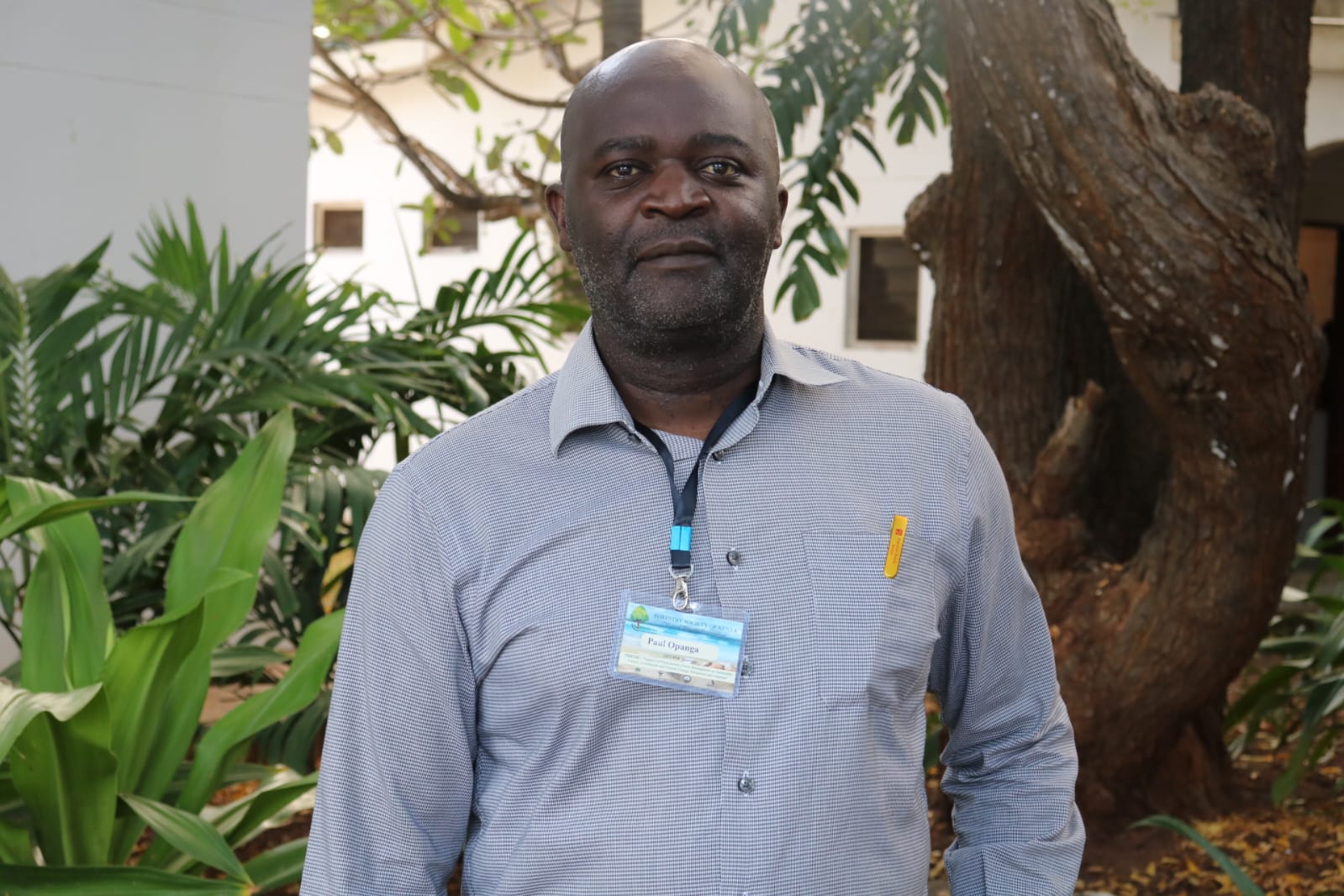A Perspective for Workers' (Labour) Day: What do workers’ rights mean for FSC?
African forests serve as a source of nutrition, health, energy, income, and employment for millions of people. Around thirty-three million people work in the forest sector worldwide. As the sector moves towards responsible forest management, there is an increase in demand for standards and solutions that protect workers’ rights.
We interview Paul Opanga, Labour Issues Manager at the Forest Stewardship Council ® (FSC ®), to honour World Day for Safety and Health at Work (28 April 2023) and Workers’ or Labour Day (1st May 2023).

What inspired you to become an advocate for workers' rights, and how did you first get involved in this work?
My family history is rich in "forestry work". My mother was a forest worker and influenced and nurtured me in Kenya where my work in forests informed my decision to become a forestry professional. It never occurred to me that I would dive deeper into advocating for workers’ rights until I was hired to coordinate forest projects for trade unions in Africa. This tilted my professional lens to understand social aspects and the need for a safe, decent, and secure environment. And particularly relevant if we want responsible forest management.
I always remain grateful to Building and Wood Workers International (BWI) not only for widening my organizing, negotiating, and influencing policy skills but also ensuring that I am equipped with knowledge and skills on International Labour Standards that has helped me navigate my current role as Labour Issues Manager in FSC. Not known to many, two of the three children I am blessed with, namely Roel and Anita are named in honour of two special people who shaped my thoughts around advocating worker rights in the forest and the world of work.
What is the importance of protecting people's rights?
The social dimension is crucial to the mission of responsible forest management, and indeed to the survival of many forests. Worker, community, and Indigenous rights must be respected as people are at the heart of forest operations. As part of its mission FSC promotes forests that are economically viable, environmentally friendly, and socially beneficial.
Responsible forest management requires workers to be skilled in many areas, including managing, protecting, harvesting, and marketing forests. They contribute to biodiversity conservation through their activities, and job-specific skills are essential. Besides conserving natural resources, responsible forest management also involves people.
To protect people and forests, it is crucial to ensure an environment that recognizes people’s RIGHTS and RESPECT these rights through international conventions and instruments, such as those of the International Labour Organization (ILO). Through such solutions, workers and community members are protected by ensuring that fundamental rights such as freedom of association and right to education.
ILO conventions, in conjunction with national policies and legislations, ensure that workers experience better working conditions, are paid a fair wage exceeding the minimum wage, and that health and safety conditions are met for all segments of the workforce to protect people and forests. Besides conserving biodiversity and reducing negative impacts of climate change, protecting, securing and developing human resources is crucial.
In what ways do FSC standards protect forest sector workers?
The Forest Stewardship Council is an organization that aims to protect forests and promote responsible forest management. One of its principles is to ensure that the rights of workers are respected and protected in forests and plantations where FSC-certified products are sourced.
To protect workers' rights, FSC establishes standards and guidelines that all companies seeking FSC certification must adhere to. These standards seek to protect and secure workers’ rights in Principle 2 of the 10 Principles and Criteria for Forest Stewardship. Protecting workers involves the following requirements:
- Respecting the four (4) fundamental principles and rights at work:
- No child labours.
- No forced or compulsory labour
- No discrimination in employment and occupation
- Freedom of association and collective bargaining
- Promotion of gender equality in employment practices.
- Implement legal occupational health and safety practices and those of the ILO Code of practice in safety and healthy in forest work.
- Pay fair wages that meet or exceed minimum wages.
- Provide training adequate for safe and effective implementation.
- Provide for grievance resolution and compensation for loss and damage.

From practical experience, FSC certification has led to the improvement of health and safety conditions . This includes the provision of better equipment and trainings, use of safety procedures and the reliance on properly qualified forest workers. In many cases, public safety has also improved through risk assessments and better signage of work zones.
In some countries , for example prior to certification, forest workers often had inadequate footwear, clothing and protective headgear and had no access to first aid equipment and training. Poor housing facilities were also a concern. However, in preparation for certification, conditions were improved. After certification adequate personal protective equipment (PPE) was provided as well as enforced, and housing facilities were improved. FSC certification brought improvements in forest workers' safety and general well-being.

What has FSC done in recent years to promote a healthy working environment in the wood industry?
FSC Standards address health and safety requirements in the following way:
- FSC health & safety requirements meet or exceed the recommendations of ILO Code of Practice on health and safety in forestry work.
- Workers receive regular training in health and safety practices.
- Workers use protective equipment appropriate to their assigned tasks; equipment is enforced.
- Employers keep records of health and safety practices including accident rates and time loss.
- Health and safety practices are reviewed and revised after major incidents and accidents.
Secondly, due to working with heavy machinery and the physical size of trees, accidents do occur from time to time . This is the reason FSC gives more attention to health and safety to ensure safe working conditions.
As a result of the ILO Conference elevating health and safety as a fundamental right, FSC members have become more engaged in health and safety. FSC's last General Assembly in October 20222 adopted a motion on health and safety. The requirement proposes workers have the right to frequently and democratically elect occupational health and safety representative in all FSC certified operations, considering the number of workers and occupational risks involved. It further calls for adequate training for health and safety representatives to exercise their responsibilities. This includes advising management and workers on health and safety best practices in the workplace.
It is critical to note that health and safety requirements are a core integral of FSC Standards. They apply to all employed persons in certified operations, including male and female, seasonal and permanent employees, contractors, and self-contractors. We hope that regular on-site and office audits and consultations with forest workers as part of the certification process ensures that stakeholders are informed about the health and safety requirements in FSC Standard.
We call upon FSC members, people working in forestry and its value chains, trade unions, researchers, and consumers to engage to further strengthen and promote safe and secure working environments for all and ensure robust discussions happen during the review of the health and safety requirements in FSC Standards.
In your opinion, what are the most pressing labour issues facing African workers today?
I would speak from the forest and wood sector where I engage with workers and trade union representatives more. A sizeable number of forest management units are far off from urban centres and a bit out of reach, which makes it difficult for labour inspectors to access them. In parts of Africa the number of labour inspectors is still minimal. It is for this reason that safety issues are less enforced and an increased vulnerability to unchecked risks. There is a need for more awareness of workplace common hazards, risks, and safety requirements in various forest operations. Let us not forget the weather conditions in hot, wet, and cold situations. Stings and bites are also a factor when it comes to workers' safety. The incidents and accidents may be unreported for fear of loss of jobs.
Fair wage is a concern and payments below national minimum wage guidelines are still evident in the region.
As forest industry has long been male dominated, we note the need to promote gender equality in employment practices. Employment opportunities for women need to go beyond nursery work to other skill sets. In some African countries, such as South Africa, we are seeing more female foresters in supervisory and management positions, which is encouraging. But there is still a long way to go in this respect.
We see some hesitancy in strengthening elements of social inclusion in particular, the aspect respecting Indigenous communities' rights as addressed under ILO Convention 169.
Fundamental rights are a thorny issue like in other parts of the world. Cases are reported of violations of freedom of association in terms of allowing workers to form unions and engaging underage children at work.
Workers’ Day serve as an opportunity to highlight these pressing issues, but we need to remember that the struggle is daily for many forest workers around the word. FSC certification is a valuable tool in assisting forest owners to not only meet but exceed the protection of fundamental human and labour rights to ensure a safer and workplace where trust and respect is cultivated.
